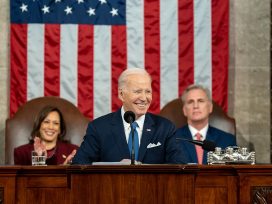Who would have thought that in only one year as president, Donald Trump would have raised some of the most important philosophical issues of our time?
On an epistemological level, he’s called into question something that we used to take for granted – that there’s an entity called ‘Truth’ that everyone more or less agrees on. After a year of ‘fake news’ and ‘alternate facts,’ we’re not so sure.
We used to have a pretty good idea of who was crazy and who was sane. Now we have a president whom some think of as brilliant and others as delusional, paranoid, and malignantly narcissistic. Either psychiatry has been set back a hundred years or 38 per cent of the American public is as crazy as he is.
On a moral level, Trump – a living example of the ‘selfish gene’ – has raised the question of whether we should be guided by altruism or self-interest. Does the US still care about its role as the Land of the Free, or should it close its borders to everybody but Norwegians?
And finally: if Truth and morality are relative, if decorum has been replaced by resentment and name-calling, and if the only thing Americans seem to agree on is that their leader is a personally unpleasant man who loves power, haven’t we entered an absurdist world where, as Albert Camus put it, ‘the only serious philosophical question is suicide’?
Whatever else President Trump achieved his first year in office, he succeeded in creating a constant state of disorientation. Most national leaders keep him at arms’ length. The American electorate is at each other’s throats. Any resolutions that Clinton voters made after the election to pay more attention to the grievances of their opponents have been forgotten, while the more sensible Trump supporters have had to put up with his misogyny, racist remarks and attacks on government institutions from the Justice Department to the FBI and CIA.
Last week’s State of the Union was a case in point. What were we to make of ninety minutes of heroic stories and flag-waving overshadowed by a picture of a world seething with murderers and rapists? Or the President’s offer of low-cost pharmaceuticals, millions of US passports to deserving immigrants and vast improvements in infrastructure in exchange for a 2000-mile-long wall, permanent separation of immigrant families and the spectre of privatizing work on federal roads and bridges?
The speech left us in a familiar place – bewildered and confused, waiting for the next set of contradictory signals to confuse us even more.
If one looks past the smoke and mirrors of tweets and TV talking heads, the President’s accomplishments this past year pretty much align with what one would expect of a businessman with no political experience, whose skills lie in making as much money as fast as he can, any way he can.
Domestically, Trump managed to appoint a business-oriented Supreme Court Justice and a few dozen conservative Federal Appellate Court judges. He rolled back regulations in all executive agencies, among them the Department of Agriculture (weaker regulation of school lunches and meat inspection), the Environmental Protection Agency (lowering of pollution standards, use of cancer-producing chemicals), and the Department of the Interior (reduction in the size of National Parks, opening public land to oil drilling). Congress passed his tax bill to reduce corporate and personal income tax, mostly for the rich, while increasing the federal deficit; the prospects for more foreign investment, higher wages and the return of American industry as a result of the bill are promising but unclear.
But being a businessman isn’t quite the same as being a President – as the President apparently realized at least once in the past year. Speaking to reporters before the State of the Union speech, he made this extraordinary statement (New York Times 31/1/18): ‘When you’re a businessman, you don’t have to worry about your heart, the heart. You really do what’s best for you, you know, for monetary reasons. You know, you make your money … In what I’m doing now, a lot of it is heart, a lot of it is compassion, a lot of it is far from making money …’
The halting cadences and vague language suggest that he meant what he said, at least when he said it. The only problem is that it came too late. Instead of demonstrating compassion, the first year of the Trump Presidency alienated most of the world.
He peppered cyberspace with insults at Mexicans, Canadians, Haitians, Iranians, Syrians, Africans, British, Russians, Chinese, Koreans, Australians, and the whole Muslim religion. His refusal to sign the Trans-Pacific Partnership, his efforts to withdraw from NAFTA, to undermine the Iran Nuclear Treaty and skip out of the Paris Accords all suggested a retreat to isolationism and, perhaps more alarmingly, an inability to do what he says he does best: make deals.
At last month’s Davos conference, his negotiating style paled next to that of Chinese leaders. While a video showed him sitting like a potentate receiving tribute from genuflecting European CEO’s, Chinese officials were running around town offering billions of investment dollars to countries as diverse as Pakistan and Brazil as part of their global One Belt One Road initiative. They made Trump look like an amateur.
What was perhaps most distressing about the President’s record was that he did little of substance for the lower-middle-class white voters who elected him. During the past year, job and wage growth were unimpressive, and the promised infrastructure bill to provide thousands of federal jobs appears to be dead in the water. Up to this point, his constituents have been remarkably loyal, but how long his tweets can substitute for legislation remains to be seen.

Photo: Adam Cohn. Source: Flickr
Unfortunately, Congress didn’t do much better. During the past year, both parties split into factions that squabbled with each other as much as with their opponents. Conflicts between establishment and newly-minted Trump Republicans prevented them from repealing Obamacare; conflicts between progressive and moderate Democrats put them in an awful negotiating position where they’ll soon have to choose between shutting down the government and accepting indigestible terms for keeping DACA immigrants in the country.
No conciliator emerged to bridge the gap between the parties and help them do what they’re paid to do: make laws. Instead, Congressional investigatory committees continued to spar publicly over the President’s Russian connections, seemingly caught in the same media frenzy as the President: nobody wanted to get down to the business of governing.
Nobody, that is, except the electorate. The one bright spot of the past political year has been that citizens – mainly women and people from minority groups – organized to bring voters to the polls and encourage newcomers to run for office. There were major upsets in Alabama and Virginia, and more will occur in 2018.
Though the Democrats may shoot themselves in the foot before the mid-term elections (they’re good at it, and will have plenty of opportunities), at this point their prospects look excellent. Which will of course exacerbate an already tense and toxic political atmosphere.
Though it’s foolhardy to predict events in American politics – was there anything more unlikely than the election of either Trump or Obama? – let’s consider one possible scenario, if only to examine a trend already taking place in other parts of the world: a willingness of the public to exchange representative democracy for more efficient authoritarian rule.
Let’s say that in 2018 the Democratic Party regains control of at least one of the Houses of Congress. Mr Trump and his supporters will be very unhappy, and the President will become even more irritable than he is now. The last two years of his administration will make the first one look like a garden party: not only will Congress shut down completely, but mudslinging between the legislative and executive branches will reach a fever pitch. Add to the mix the possible retirement of one or more Supreme Court Justices, and Washington will look like the Circus Maximus.
But let’s say that the President survives all this, plus whatever Special Counsel Mueller and the House Intelligence Committee unearth about his connections to Russian influence peddlers. Will he be re-nominated by his party in 2020? Possibly not. By that time his base may have shrunk to a group of diehards, and the smart money may gravitate to more middle-of-the-road candidates. Whom will the Democrats nominate? Won’t they be obliged to choose someone from the left, the faction that returned them to power? But nobody from either wing of their party appears able to reach a cross-section of voters – especially the 38 per cent who won’t know whom to turn to.
What worries me is that we still haven’t taken to heart one of the more important lessons of the 2016 election. Effective leader or not, the election of Donald Trump underlined a wish on the part of an unexpectedly large group of voters for a strong man to lead the country. The trend that he started – to elect a rich businessman eager to dictate policy rather than to seek consensus – may turn up someone smarter and less volatile.
One potential candidate is Michael Bloomberg, the Republican ex-mayor of New York. In 2016 Bloomberg briefly considered running but thought better of it: he likes to play the percentages.
In many ways, Bloomberg is the epitome of the benevolent despot. Like Trump he’s a businessman, but a brilliant one; Wikipedia lists him as the tenth richest man in the world. As mayor of New York he was a moderate who shaded toward the left on social issues but was close to real estate interests and contributed little to the development of affordable housing, New York’s most pressing problem. What was most worrisome was his authoritarian streak. Though New York mayors were limited to two four-year terms, Bloomberg petitioned the City Council to reverse the law to allow him to run for a third term; needless to say, they did and he won.
There’s no guarantee that in 2020 Bloomberg will run or win or act like a despot. He is Jewish, a group that hasn’t been elected often to high offices in the US; and by then he’ll be 78, a fact that even daily workouts with a personal trainer can’t remedy. But one can’t help feeling that behind all the fireworks of this tumultuous past year, a gradual eroding of representative democracy has been taking place; and unless Congress reasserts its constitutional responsibility to guide the country, the future President – whoever he is – will be happy to do so.









